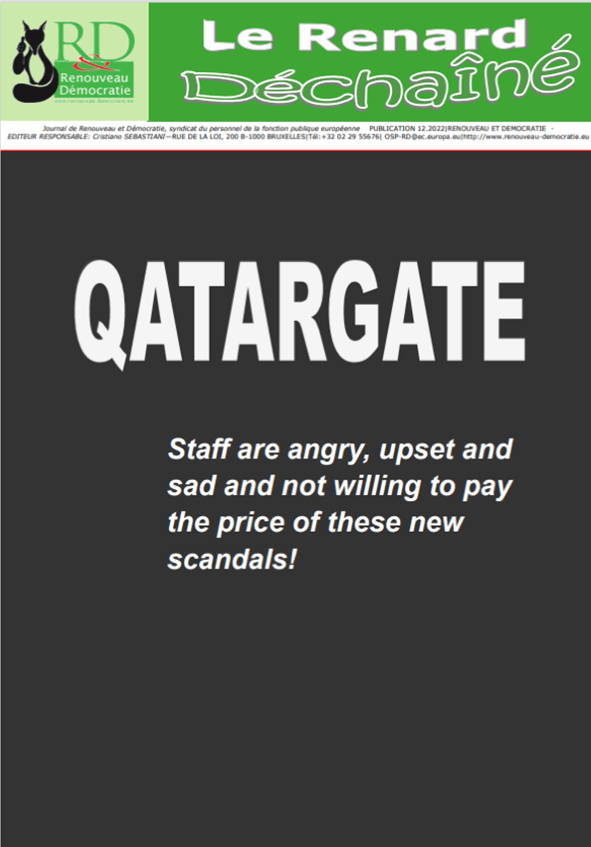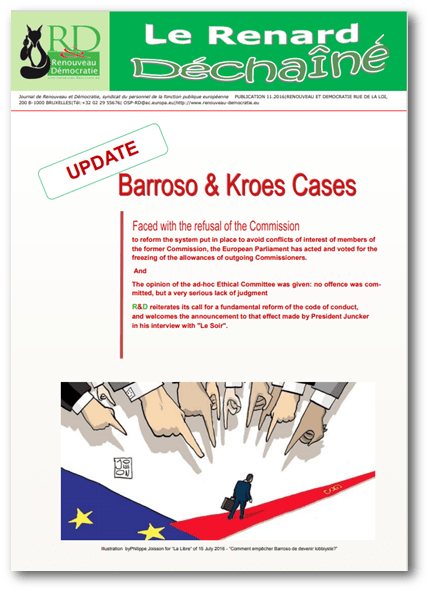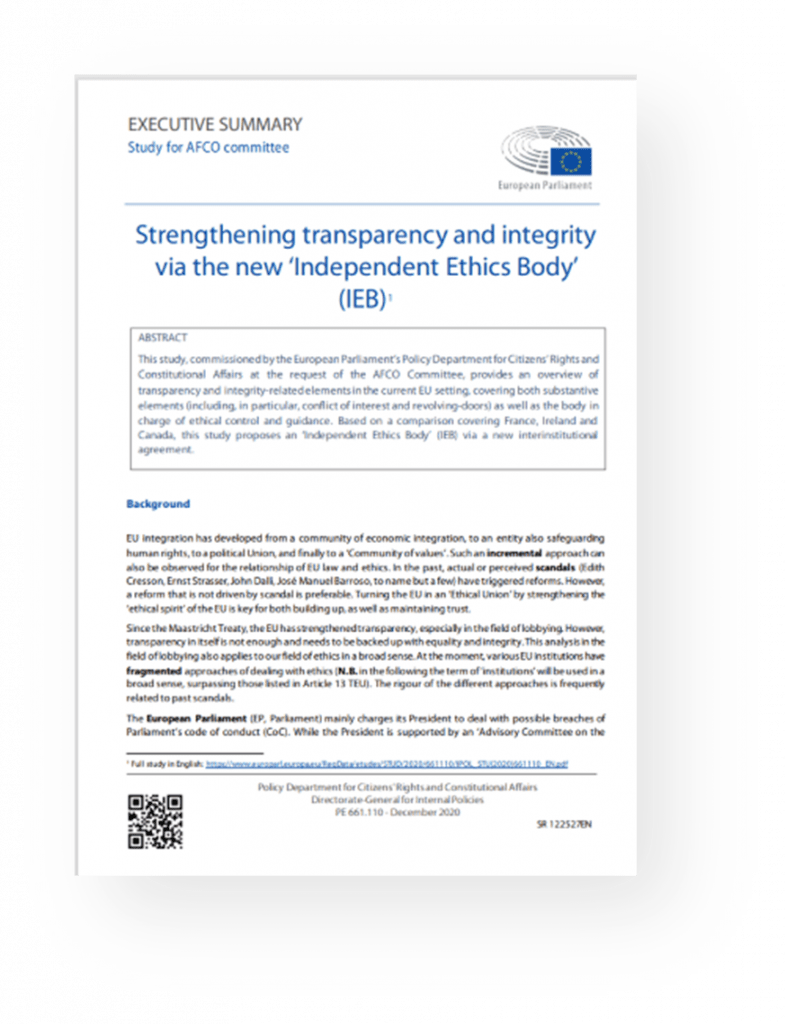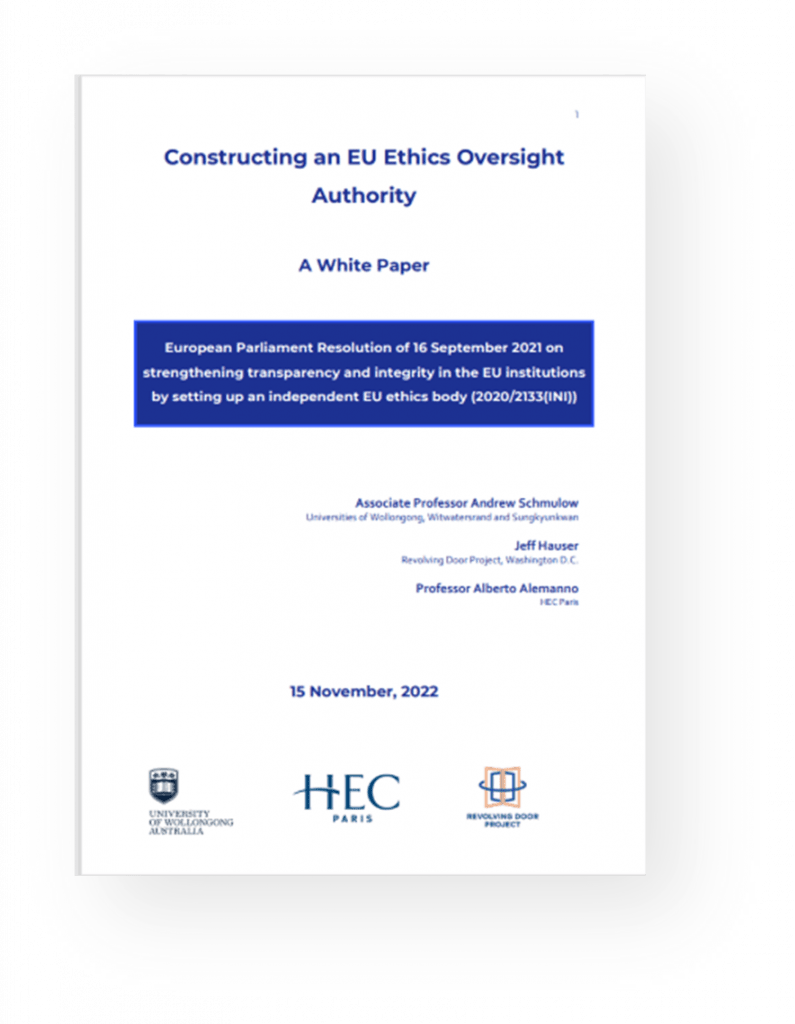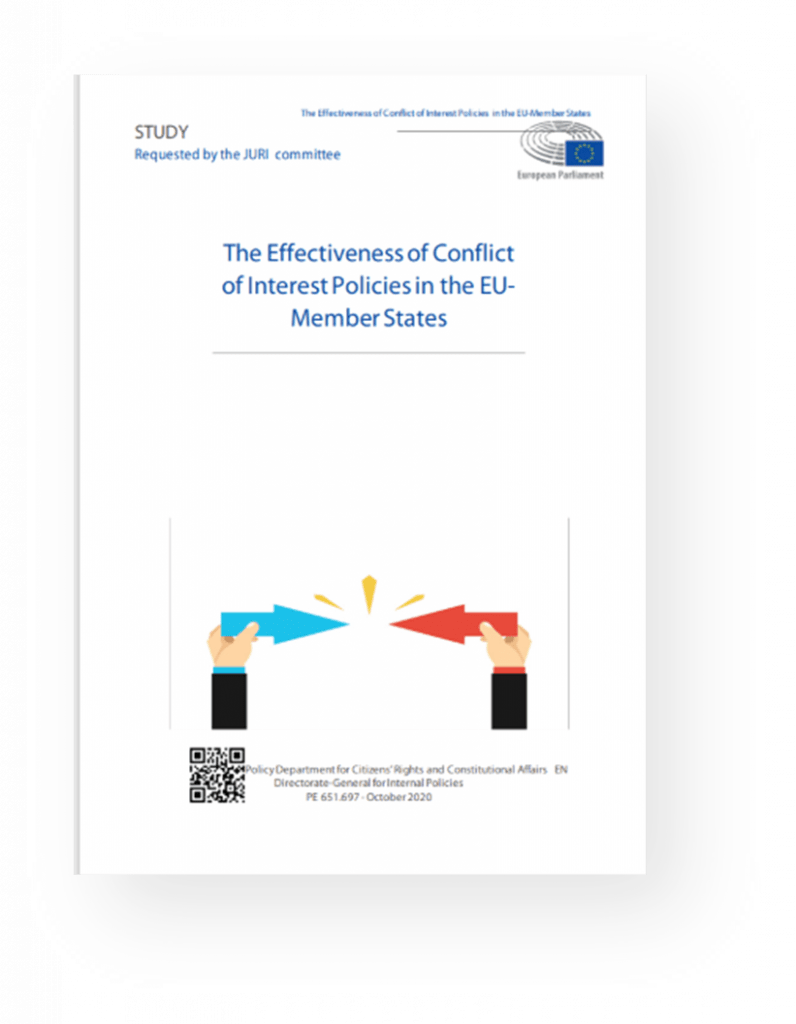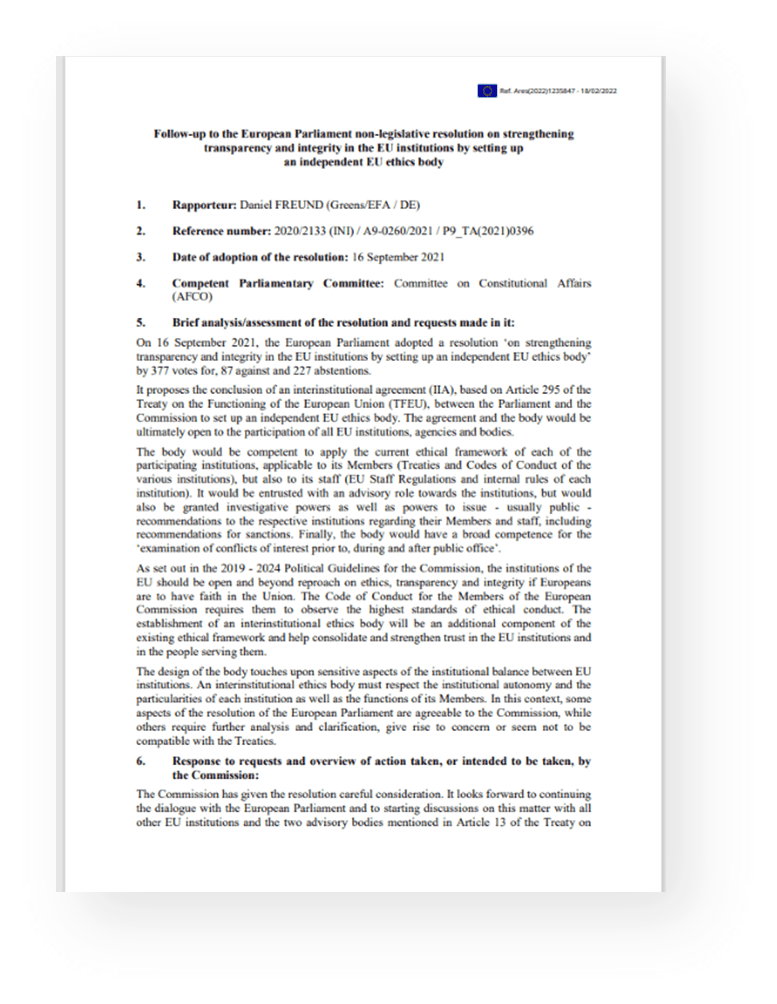QATARGATE
Staff are angry, upset and sad and
not willing to pay the price of these new scandals!
Let us be very clear: there is no question of a new Reform as in 2004 following the resignations of the Santer Commission, under the pretext of setting up new rules responding to these new scandals !
The EU ethics standards set by the Staff Regulations are already robust, more robust than many national and regional rules in the EU. However, the problem is often that these rules are not so robustly enforced.
Having heard the statements of our President Von der Leyen and seen several press articles thanking us for always having stood up for the highest standards of integrity and independence of the EU institutions, so many of you asked R&D :
– In your opinion, what are the answers that must be given and the other step forward that should be taken by EU institutions to demonstrate that they have fully understood the tremendous credibility crisis that is now affecting them due the “most shocking integrity scandal in the history of the EU”? *
– What exactly is this independent ethics body for ethics to all EU Institutions proposed by President Von der Leyen, where does this proposal come from, what is the state of play of the current negotiations and what are the conditions to be imposed to avoid that it is not a new useless body unable to prevent new scandals?
R&D answers your questions:
R&D always standing for the highest standards of integrity and independence of the EU institutions…
R&D has always worked at all levels to ensure that the rules on “revolving doors” and conflicts of interest are strengthened in order to avoid new scandals.
We should never forget that the effects of unresolved conflicts of interest can lead to corruption. Together – conflicts of interest and revolving doors – diminish the confidence and trust that EU citizens have in EU Institutions and in the EU Project.
As such, resolving conflicts of interest and closing the revolving doors – ethics oversight – are important and essential activities, and should be conducted within a framework which is fit for purpose.
In response to approaches that seek to trivialize its gravity, accusations of stigmatizing EU institutions when we ask them to set an example by applying the highest ethical standards and effective procedures to ensure its proper application and to punish with the utmost severity any violation found, R&D has been repeating over and over again that it is absolutely necessary to apprehend with all the required seriousness the disastrous consequences of any case of proven corruption, conflict of interest and ‘revolving doors’.
Consequences which go far beyond the sole responsibility of the individual and even of the concerned Institution, since it tarnishes the reputation of all EU institutions, of the EU project and of our civil service.
R&D has never forgotten that we must be the true guarantors of the general interest of European citizens and, as such, be transparent and impervious to any pressure from lobbies and private interests.
A fight that is now even more crucial in order to respond to the wave of defiance towards the European institutions, EU project and our public service caused by the suspicions of corruption in the European Parliament…
On the one hand, concerning the individual responsibilities, in the greatest respect of the presumption of innocence and the right to defence, it will be up to the judiciary to carry out all the necessary verifications and, if necessary, to draw all the consequences. This also concerns the responsibility of the state of Qatar, which has categorically rejected any attempts to associate it with accusations of misconduct.
On the other hand, it is already clear, as President Von der Leyen has rightly pointed out, that “These allegations are extremely worrying. It is a question of trust in the people at the heart of our institutions. This trust presupposes high standards of independence and integrity”, calling then on the EU institutions to follow the “highest standards”, “as it is “essential” not only to have strong rules, but also to ensure that they are the same for all EU institutions and that there are no “exceptions”.
As Commissioner Gentiloni has rightly pointed out: “If confirmed, it would mean that MEPs and activists received money to turn a blind eye to the conditions of workers in Qatar and It’s a shame and it’s unacceptable.”
Likewise we fully support President Metsola’ commitments that “There will be no impunity. There will be no sweeping under the carpet. There will be no business as usual” and she also right in denouncing that the European democracy is under attack.
This is all the more regrettable that once more the European institutions have not been able to defend European democracy by themselves, given that to uncover these scandals, the intervention of the Belgian authorities has been necessary.
What are the answers that must be given and other step forward that should be taken by EU institutions to demonstrate that they have fully understood the tremendous credibility crisis that is now affecting them due the “most shocking integrity scandal in the history of the EU”?
- 1. Make mandatory EU Transparency Register and lobbying from third countries — be it by embassies or third parties — must also be published in the EU Transparency Register
In this respect, we support the proposal* the EU Transparency Register must become mandatory through the adoption of a legislative act — as opposed to a mere inter-institutional agreement — and be strengthened by additional resources.
A clear commitment is needed from all institutions to only accept meetings with registered lobbyists and to publish all lobby meetings on a central website that is linked to the common EU transparency register.
And lobbying from third countries — be it by embassies or third parties — must also be published in the EU Transparency Register. Right now, governments are exempted from the EU’s already soft transparency rules. Likewise, meetings with representatives of third countries should be disclosed by all EU institutions, including by individual MEPs.
- 2. To set up an INDEPENDENT BODY FOR ETHICS to all EU institutions
In order to provide an appropriate answer to the dramatic consequences of these scandals, President Von der Leyen called again for the creation of an independent ethics body common to all EU Institutions, that she proposed back in 2019 when appointed underling that “The principles of having such a body in charge of ethics, with clear rules about what should be reviewed, how and when and what should be published, would be a big step forward.”
As confirmed inter alia by the Ombudsman, the setup, with no further delay, of such an independent body is one of the very appropriate answers to the deep mistrust that is now affecting EU Institutions.
Indeed, independent monitoring can finally contribute to credible enforcement of the rules, put an end to the conflict of interest and “revolving doors” between the institutions and lobbying, and start to regain the trust of citizens.
A new INDEPENDENT BODY FOR ETHICS common to all EU institutions that cannot simply be a “thin layer,” an “advisory board” without any power to investigate or enforce ethics rules across EU institutions.
Indeed, the independent ethics body being simply a “thin layer,” an “advisory board” without the power to investigate or enforce rules across EU institutions, is now regrettably the result of negotiations between the EU institutions that have been going on for too long.
As it has been rightly pointed out also by the Ombudsman, without investigative and sanctioning power, the risk is to create yet another organization that — by design — can’t deliver on its mission.
And it is now crucial to go faster than ever!
In the light of the seriousness of the current crisis, there can be no question of waiting any longer the to put in place the appropriate measures.
In this respect it must not be forgotten that the negotiations to set up the independent ethics body have been going on for 3 years and are still far from an acceptable solution, and that Commission has proposed a mandatory transparency register for all EU institutions, already back in 2016 and that it took five years for the Parliament and Council to agree to it.
R&D answers your questions
Having heard the statements of our President von der Leyen and seen several press articles referring to the independent ethics body common to all EU institutions, many of you asked R&D:
- What exactly is this independent ethics body for ethics to all EU Institutions and where does this proposal come from and what is the state of play of the current negotiations?
- What are the conditions to be imposed to avoid that it is not a new useless body unable to prevent new scandals?
- In keeping with our commitment to inform you in a timely and detailed manner, you will find below the requested clarifications.
Reminder of the facts
- 1. The “Barroso case”
The outrageous revolving door case of former President Barroso had given rise to a staff petition “Not in our name” initiated by a collective of colleagues, signed by 152,000 people including thousands of staff members (see Petition For strong exemplary measures to be taken against JM Barroso for joining Goldman Sachs Change.org)
R&D supported this petition with the utmost conviction before the press, the European Ombudsman and also before the Council and the European Parliament, and undertook to continue its efforts in this area.
The great success of this petition led the Commission to review the Code of Conduct for the former members of the College by deciding to increase the period of prohibition on revolving doors from 18 months to two years for former Commissioners and three years for the former President of the Commission, and by strengthening the powers of the panel of external members responsible for ensuring its proper application.
Just like the European Ombudsman and the EP, R&D had stressed that, although a step in the right direction had been taken to protect the credibility of the institution and to take into account the expectations of citizens, a real in-depth revision of the Code of Conduct should have been carried out.
And R&D requested to set up of a “strong, independent ethical body with a real power of investigation and sanction”.
Unfortunately, the Juncker Commission did not follow these recommendations, which were instead duly taken into account by President von der Leyen.
- 2. President von der Leyen’s political guidelines and the creation of a new independent ethics body common to all EU institutions
It was with great satisfaction that R&D took note of the political orientations presented by President von der Leyen as soon as she took office in December 2019, confirming in particular:
“If citizens were to have faith in the EU, its institutions should be open and beyond reproach on ethics, transparency and integrity.
The members of all EU institutions and the staff of the entire European civil service have ethical obligations which are laid down in the Treaties, in legislation and in internal rules.
These ethical obligations are intended to ensure that Members and staff perform their respective duties with independence and demonstrate the integrity that the public has a right to expect from men and women entrusted with public tasks and powers.
The Commission is committed to supporting the creation of an independent ethics body common to all EU institutions and to engaging and working closely with the other institutions to achieve this”.
R&D agrees more than ever with the statements made by our President and considers that the proposed mechanism responds to the requests of European citizens and colleagues who were behind the petition concerning the “Barroso and Kroes cases”.
Opinion of the European Parliament (EP) Texts adopted – Strengthening transparency and integrity in the EU institutions by setting up an independent EU ethics body – Thursday, 16 September 2021 (europa.eu)
In its resolution, the EP confirms that the setting up of an independent EU Ethics body is an important step towards eliminating conflicts of interest and revolving doors concerns in the EU institutions, as it is indisputable that self-regulation has not been able to prevent scandals.
Thus, the EP underlines that such an independent body should be accessible to all EU institutions with the power to open investigations into possible conflicts of interest or ‘revolving doors’ cases.
This should be done in accordance with the principle of “double vigilance” based on information received from third parties, such as journalists, NGOs, whistleblowers or the European Ombudsman – while applying the protection of anonymity where necessary and working in close cooperation with national authorities and other relevant EU bodies and agencies, such as OLAF and the European Prosecutor’s Office.
As regards its composition, the EP considers that the ethics body should be composed of nine members, namely three chosen by the Commission, three elected by the Parliament and three appointed de jure from among former judges of the Court of Justice, the Court of Auditors and former European Ombudsmen.
It is particularly appreciated that the EP supported R&D‘s request and considered that, for files regarding senior managers, staff representatives from the institution of the person concerned should be included in the body’s composition.
When an infringement is brought to its attention, the committee would act in two phases – a confidential stage where it would make recommendations to stop the infringement and give the person concerned the opportunity to be heard; – in case of refusal to correct the infringement, a recommendation for sanction would be published and the authority competent to act would have to decide on the follow-up within 20 working days.
In the context of the preparation of the resolution, the EP also relied on the results of several studies launched in this regard that provided a very helpful overview on the existing similar bodies and their operation, as well as on the results obtained:
The Commission’s response to the EP opinion
In its response of 18 February 2022, the Commission, while welcoming the EP’s opinion, made some remarks and suggestions in order to reach a final agreement.
In particular, the Commission pointed out that a single set of ethical rules for all would most likely lead to a set of very general principles, which would have to be complemented by specific rules for the members of each institution and it can be expected that lengthy negotiations will be necessary to reach an agreement. This does not exclude discussions on a set of common principles in line with the Treaty provisions applicable to the different institutions.
If the institutions agree on the creation of a single independent ethics body and if the tasks and functioning of this future body are similar to those of its current independent Commission Ethics Committee, the Commission has confirmed to be ready to consider terminating its functioning and entrusting its tasks to the new body.
Furthermore, the Commission indicated that the competence of the Committee should be limited to cases concerning members of the College, MEPs and members of the other institutions considering that it is not reasonable to submit to this new independent ethics body all the requests submitted each year by staff members, as it would clearly be unable to ensure their proper treatment.
In conclusion, the Commission welcomed the resolution adopted by the Parliament, confirming that it represents an important contribution to the discussions between all institutions.
In this context, the Commission expressed its readiness to play its part in the preparatory work for the establishment of this independent ethics body, by taking the responsibility to consult the other institutions, by explaining its position and asking for their opinion on the EP resolution.
It is this negotiation that must now be revived with new energy in order to set with no further delay an effective and credible EU ethics body common to all EU institutions.
Conclusion
Staff are not willing to pay the price of these new scandals of which we are in no way responsible and of which we are equally victim with our credibility and reputation affected among European citizens.
Thus, there is no question of a new Reform of the Staff Regulations as in 2004 following the resignations of the Santer Commission, under the pretext of setting up new rules responding to these new scandals!
The EU’s ethics standards are already robust, more robust than many national and regional rules in the EU.
However, the problem is often that these rules are not so robustly enforced.
For example, despite twenty-four alleged breaches of the code of conduct in the last EU Parliamentary term, no actual sanction was ever taken.
In this respect, the disastrous management and laughable sanctions adopted by the Commission in the “Barroso and Kroes cases”, must also be recalled.
This lack of enforcement is largely due to the fact that the EU institutions are operated under a fractured self-monitoring system. Different institutions had their own ethics bodies.
In order to deal with the wave of discredit following the “Qatargate”, it is now more important than ever that the EU acts fast and effectively to preserve and promote citizens’ faith in EU democracy, institutions, and in civil service. Citizens must have trust that all the actors of the EU project are all working for them, and not for themselves or vested interests.
As it has rightly pointed out, ultimately, the scandal taking place is an ugly one. Its very ugliness should motivate the EU’s political leaders to finally make things right.
R&D asks the Commission to lead at the highest level with a reinforced energy the negotiations with the EP and with the other EU institutions, in order to make mandatory EU Transparency Register and set up with no further delay an effective, credible and independent EU ethics body common to all EU institutions.
An EU ethics body that cannot be a simple “thin layer,” or and “advisory body” without investigative and sanctioning power.
In this respect, R&D shares the legal opinion that there is a case for creating a single, permanent and independent ethics body at EU level to minimise the risk of unethical behaviour and that it is legally possible under EU law to create such a body by bringing together existing supervisory, investigative, sanctioning and advisory powers.
Successive crises have shown us that it is only together, i.e., EU Institutions, their staff and theirs representatives, that we will be able to defend the EU project and the excellence, the integrity and the independence of the European civil service by enabling them to successfully withstand attacks made against it by the opponents of the European project.
Cristiano Sebastiani,
President

